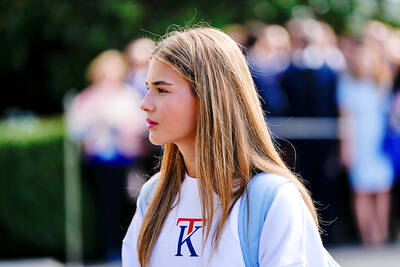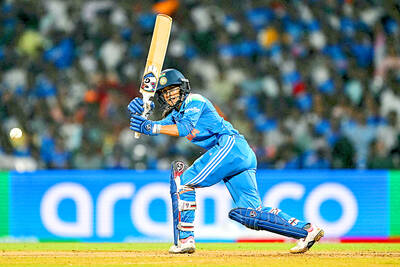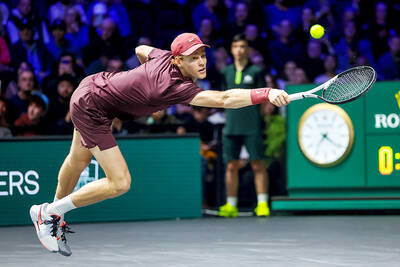With the World Cup finals in South Africa only a few months away, World Cup fever is picking up around the globe.
Even in Taiwan the event will attract a devout following, but contemplating the day when the national team actually makes it to soccer’s biggest event is an entirely different story.
Local soccer experts agree that funding, culture and a proper structure are the keys to developing the sport in Taiwan, where the game has long struggled to gain a foothold.
The foremost goal is to create a “soccer culture,” which has been nonexistent in a nation far more passionate about basketball and baseball, said Lin De-jia, secretary-general of the Chinese Taipei Football Association (CTFA).
Without a professional league and a soccer culture, children don’t have the motivation to participate in the sport, Lin said.
It’s not a secret that Taiwan, currently ranked 162nd in the world, has long been an international soccer minnow, registering five wins, five draws and 41 losses in World Cup qualifying matches from 1958 to this year. The team has scored only 28 goals in those games, while surrendering 182.
Led by Japanese head coach Toshiaki Imai, Taiwan’s World Cup qualifying campaign for this year’s finals quickly evaporated in October 2007 when Uzbekistan defeated them by an aggregate 11-0 scoreline.
In order to change its lowly status, Taiwan needs to focus on developing its youth soccer programs, said Frenchman David Camhi, who is familiar with Taiwanese soccer and has been running a training camp for children in Taipei with some friends for six years.
All training and competitions take place within the education system, based on the US model, as was the case in Japan in the late 1980s and early 1990s, Camhi wrote in Kick-Off magazine, and he argues it is the wrong approach.
“Japan now has three professional leagues, nine regional leagues, 46 prefecture leagues and many more municipal leagues. A football pyramid with eight levels,” Camhi wrote.
With such a structure in place, Japan managed within approximately 12 years to progress to the second round of the FIFA World Cup finals in 2002 and to qualify in 2006 and this year.
“It’s something the football authorities and other sporting bodies in Taiwan should look into,” he wrote.
When there is a much larger talent pool, the overall competitive level of the sport will be elevated, said Camhi, who arrived in Taiwan in 1999 and has been working on promoting and teaching the game to children since that time.
Other than the lack of a professional league, funding has also been a problem, Lin said.
“Taiwan’s government sees the CTFA as nothing more than one of more than 60 sports associations in the country,” he said.
Lin said the association previously received NT$10 million (US$312,000) in funding from the government each year, but that amount dropped to NT$6 million last year. That’s a pittance compared with the NT$30 million the CTFA spends to send teams, ranging from under-13 to the senior level, abroad to play in 20 to 30 international competitions each year, Lin said.
He does acknowledge that there have been some sparks of interest over the past decade, including after the 2002 World Cup in Japan and South Korea when Taiwanese passion for soccer did pick up a little.
Since then, Lin said, more schoolchildren have participated and more schools have organized teams, enabling the nation’s youth teams to fare better in competitions.
Camhi said a number of elite young Taiwanese players are even capable of playing professionally now, though because they lack exposure they are not recruited by European or South American clubs.
Both Lin and Camhi acknowledge that the development of the local game will take a long time and requires patience.
Lin urged the government to plan for the long-term rather than rush for immediate results and he urged officials to rethink their policy of establishing “sports classes” — which gather the best athletes into a single class — because it works against achieving the long-term objective.
Such classes actually limit participation in sports and discourages schools without sports classes from organizing teams because they cannot compete with the better schools, he argued.
That’s not good because the future is the younger generation, Camhi said. Only by working from the bottom up can Taiwan improve its performance and some day “reach my ultimate goal for Taiwan — to qualify for the World Cup,” he said.

US President Donald Trump’s granddaughter, Kai Trump, is poised to make her LPGA Tour debut after receiving a sponsor invitation on Tuesday to the Nov. 13 to 16 tournament at Pelican Golf Club in Florida. “My dream has been to compete with the best in the world on the LPGA Tour,” Kai Trump said in a statement posted on the LPGA’s Web site. “This event will be an incredible experience,” she said. “I look forward [to] meeting and competing against so many of my heroes and mentors in golf as I make my LPGA Tour debut.” The 18-year-old high-school senior,

REACTION: Less than 24 hours after a 18-inning Game 3 loss, the Blue Jays’ win ensured that the best-of-seven series is to head back to Toronto for Game 6 tomorrow Vladimir Guerrero Jr on Tuesday blasted a two-run home run as the Toronto Blue Jays bounced back to defeat the Los Angeles Dodgers 6-2 and tie the MLB World Series at two games apiece. Less than 24 hours after a shattering 18-inning Game 3 loss, the Blue Jays climbed off the canvas to breathe new life into their hopes of a first MLB title in 32 years. Guerrero’s two-run blast off Dodgers starter Shohei Ohtani and a superb pitching performance from ace Shane Bieber laid the foundations for a gutsy victory that silenced Dodger Stadium. “I’m always trying to compete

Jemimah Rodrigues on Thursday hit an unbeaten 127 as India pulled off a record chase of 339 against Australia to set up a Women’s World Cup final against South Africa. Rodrigues and skipper Harmanpreet Kaur, who hit 89, put on 167 runs for the third wicket as India won with nine balls and five wickets to spare at DY Patil Stadium, on the outskirts of Mumbai. The hosts finished on a total of 341-5 in reply to Australia’s impressive 338 and ensured there would be a new name on the 50-over trophy tomorrow. Amanjot Kaur hit the winning boundary to trigger wild celebrations

Jannik Sinner on Thursday eased past Francisco Cerundolo 7-5, 6-1 at the Paris Masters to set up a quarter-final clash with Ben Shelton, while reigning champion Alexander Zverev earned a straight-sets win over Alejandro Davidovich Fokina in the third round. A maiden crown in the French capital would return Sinner to No. 1 in the world rankings after current incumbent Carlos Alcaraz suffered a shock early exit at the hands of Britain’s Cameron Norrie. The Italian four-time Grand Slam champion is yet to drop a set in the tournament as he hones in on what would be a fifth title of the